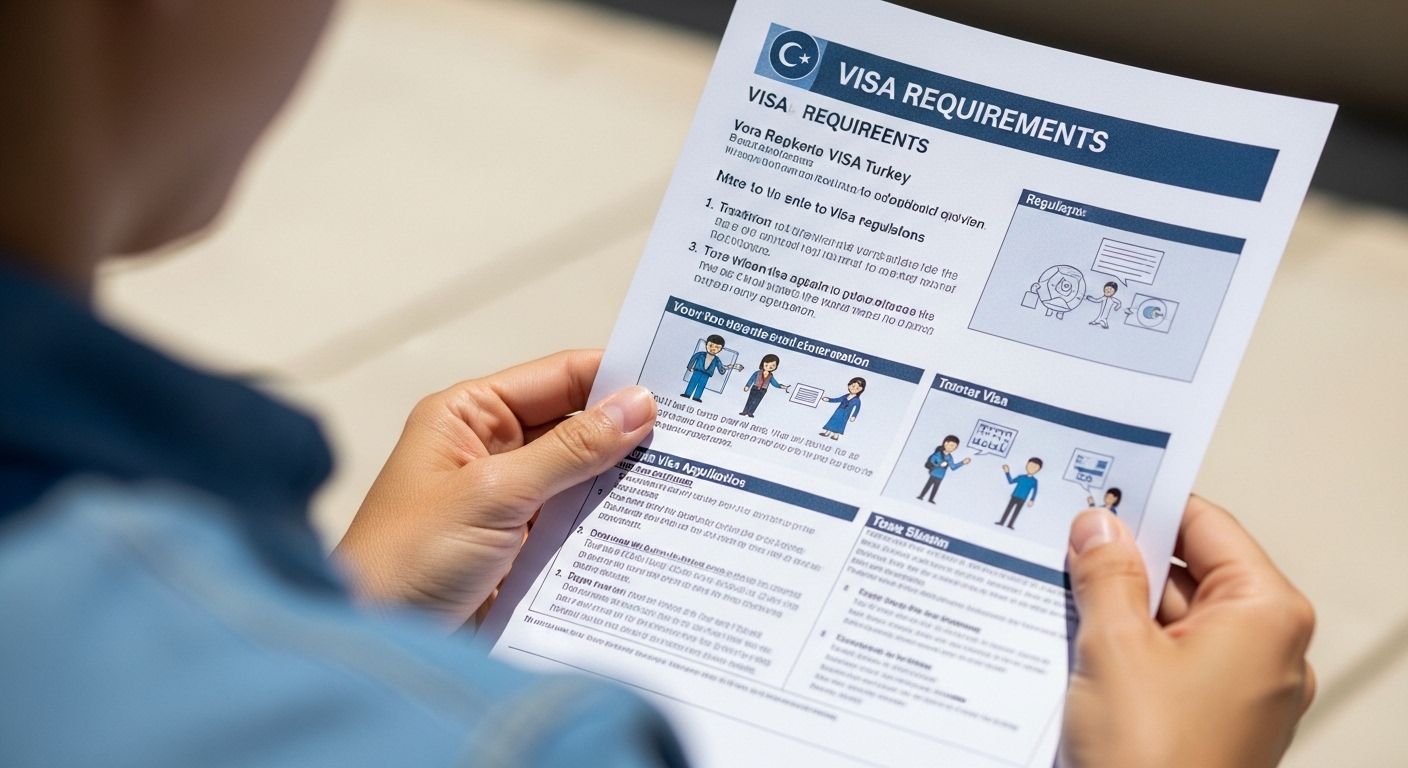Visa Requirements for Turkey
Discover the complete guide to Turkey’s visa policy, who needs a visa, how to apply, types of visas, fees, and tips for a smooth travel experience.

Visa Requirements for Turkey
Planning a trip to Turkey? Whether you’re dreaming of exploring Istanbul’s bustling bazaars, relaxing on the beaches of Antalya, or soaking in the surreal landscapes of Cappadocia, understanding Turkey’s visa requirements is crucial. Nobody wants last-minute surprises at the airport or the border. This guide breaks down everything you need to know, so you can spend more time planning your adventure and less time stressing over paperwork.
Introduction to Turkey’s Visa Policy
Turkey sits at the crossroads of Europe and Asia, making it a melting pot of cultures and a major travel hub. As such, its visa policy is designed to balance security with ease of travel. Over the years, Turkey has modernized its system, introducing convenient options like the e-Visa, which allows travelers from many countries to apply online in minutes.
But don’t be fooled into thinking it’s one-size-fits-all. Your nationality, purpose of visit, and length of stay all play a role in determining what type of visa you need—if you need one at all. Getting familiar with these rules beforehand saves you from unnecessary headaches. After all, who wants to spend their vacation dealing with immigration issues?
So, whether you’re a tourist, a student, or someone considering a work stint in Turkey, this guide will walk you through the visa maze step by step. Keep reading to find out exactly what applies to you.
Why Understanding Visa Requirements Matters
Picture this: you’ve packed your bags, booked your hotel, and told everyone you’re off to Turkey. You arrive at the airport brimming with excitement, only to be denied boarding because you didn’t secure the right visa. Heartbreaking, right? This happens more often than you’d think.
Visa requirements vary not just from country to country but sometimes even within the same passport group, depending on bilateral agreements and current diplomatic relations. On top of that, rules can change overnight, especially in today’s unpredictable global climate.
Moreover, overstaying your visa or entering without one can lead to fines, deportation, or being blacklisted from future visits—not the kind of souvenirs you want to bring home. That’s why it pays to invest a little time in understanding what’s required of you. It’s the difference between a dream trip and a travel nightmare.
Who Needs a Visa to Enter Turkey?
Not everyone needs a visa to enter Turkey, but assuming you don’t could be a costly mistake. The Turkish government divides visitors into three main groups: those who can enter visa-free, those who are eligible for an e-Visa, and those who must apply for a sticker visa through an embassy or consulate.
Visa-Free Countries
Turkey has bilateral agreements with several countries that allow citizens to enter without a visa for short stays—usually up to 90 days within a 180-day period. European Union citizens (except a few), Japanese tourists, and some Latin American countries fall into this category.
However, even if you’re from a visa-exempt country, there are conditions. For example, you must not engage in paid work and must not overstay your allowed period. Immigration officers may still ask for proof of accommodation, return tickets, and sufficient funds for your stay.
It’s wise to double-check your status before you travel. Immigration rules can change, especially in response to global events or new diplomatic agreements.
E-Visa Eligible Countries
For many travelers, the Turkish e-Visa is a lifesaver. Nationals from countries like the United States, Canada, Australia, and most of the Middle East can apply for this visa online in just a few minutes. The process is simple: fill out the form, pay the fee, and receive your visa by email.
An e-Visa typically allows for tourism or business visits for up to 30 or 90 days, depending on your nationality. It’s valid for multiple entries in most cases, but you should always verify your specific conditions before you book your flights.
Tip: Only use the official Turkish government website to apply for your e-Visa. Many third-party sites charge extra fees and sometimes cause delays.
Countries Requiring a Sticker Visa
Travelers from countries not eligible for visa-free entry or an e-Visa must apply for a traditional sticker visa. This involves booking an appointment at a Turkish embassy or consulate, submitting supporting documents, and sometimes attending an interview.
The sticker visa is generally more detailed and time-consuming to obtain, so plan ahead. This type of visa can cover various purposes—tourism, work, study, or long-term stays. Processing times vary by country and visa type.
If you fall into this category, start your application well in advance of your planned departure date to avoid last-minute hiccups.
Types of Turkish Visas Explained
Once you know whether you need a visa, the next step is figuring out which type suits your purpose. Turkey offers several visa categories, each with its own requirements and duration of stay. Choosing the right one is key to avoiding legal issues during your trip.
Tourist Visa
This is the most common visa for travelers visiting Turkey for leisure, sightseeing, or visiting friends and family. It can be an e-Visa for eligible nationalities or a sticker visa for others.
A tourist visa typically allows stays of 30 to 90 days within a 180-day period. You can’t work or study with this visa, so if you plan to do either, you’ll need a different type.
When applying, you may need to show proof of accommodation, a round-trip ticket, travel insurance, and sufficient funds. Some travelers get asked for a hotel booking or an invitation letter from a host in Turkey.
Keep in mind that Turkish immigration is strict about overstaying. Even a single day over your permitted stay can result in fines or a ban on future visits.
Business Visa
If you’re heading to Turkey for work meetings, conferences, trade fairs, or to explore investment opportunities—but not to take up full-time employment—you’ll likely need a business visa. For citizens from e-Visa-eligible countries, the process is quick and straightforward: apply online, pay the fee, and download your approved visa.
However, if your nationality requires a sticker visa, prepare to visit a Turkish embassy or consulate with proper documentation. Typical requirements include an invitation letter from the Turkish company you plan to visit, proof of your business relationship, hotel reservations, return flights, and sometimes evidence of sufficient funds.
A business visa usually allows stays of up to 30 or 90 days within a 180-day period, depending on your nationality and the type of visa issued. It’s strictly for business-related activities—so don’t think about taking up paid work on the side. Turkish immigration takes violations seriously, and being caught can result in fines, deportation, and blacklisting.
Student Visa
Dreaming of studying in Turkey? You’re not alone. Turkish universities attract thousands of international students every year, thanks to affordable tuition fees and a rich cultural experience. If you plan to enroll in an academic program lasting more than 90 days, you’ll need a student visa.
Unlike the tourist or business visa, you can’t get a student visa through the e-Visa system. Instead, you must apply through a Turkish consulate or embassy in your home country. Required documents typically include an acceptance letter from a recognized Turkish educational institution, proof of accommodation (like a dormitory or apartment contract), and evidence that you have enough money to support yourself during your studies.
Once you arrive in Turkey, don’t forget: a student visa alone is not enough for a long-term stay. You must register with the local immigration office within 30 days of arrival to obtain a residence permit. This residence permit will cover your entire study period.
Failing to secure your permit can lead to legal headaches—trust me, dealing with Turkish bureaucracy isn’t how you want to spend your study abroad adventure!
Work Visa
Turkey’s growing economy means more foreigners are looking to live and work there. But unlike tourist or student visas, work visas are a bit more complicated. You can’t just show up and start working; you need a job offer first.
Here’s how it works: your Turkish employer must apply to the Ministry of Labor and Social Security on your behalf, while you apply at a Turkish consulate in your country. Both applications must be submitted within 10 days of each other. Required documents include your job offer letter, a valid passport, and proof of qualifications or professional experience.
Once approved, you’ll get a work visa allowing you to enter Turkey legally. After arrival, you must also apply for a work permit and residence permit. Skipping these steps or working illegally can result in steep fines and deportation.
Many expats find the paperwork daunting, so it’s a good idea to have a local legal advisor or your employer’s HR department guide you through the process.
How to Apply for a Turkish Visa
Applying for a Turkish visa is relatively straightforward, but the process differs based on the type of visa you need and your country of citizenship.
Online E-Visa Application Process
For travelers lucky enough to qualify for the e-Visa, the process is refreshingly simple. Here’s how it works:
Visit the Official Website: The only official site is www.evisa.gov.tr. Avoid unofficial sites—they often charge extra fees.
Fill Out the Application: Provide basic information like your name, passport details, and travel dates.
Pay the Fee: Payment can be made by credit or debit card. Fees vary by nationality.
Download Your E-Visa: Once approved (often instantly), you’ll get a PDF copy. Print it out and keep a digital copy on your phone—Turkish border officers may ask for it.
Double-check all information before submitting. Even a small typo can cause delays or rejection at the border.
Applying at an Embassy or Consulate
If you need a sticker visa or a long-term visa (like for work or study), you’ll have to handle things the old-fashioned way. Here’s a general outline:
Schedule an Appointment: Visit the nearest Turkish embassy or consulate’s website to book a slot.
Prepare Documents: Typical requirements include your passport, application form, passport-sized photos, travel itinerary, proof of accommodation, bank statements, and a visa fee receipt.
Attend the Appointment: Some applicants might be asked to attend an interview. Bring all original documents and copies.
Wait for Processing: Depending on your visa type and where you apply, processing can take from a few days to a few weeks.
Always apply well in advance of your intended travel date to avoid last-minute surprises.
Documents Required for a Turkish Visa
No matter what visa you’re applying for, having the correct documents is essential. Missing paperwork is the top reason for delays or rejections.
Mandatory Documents
For most short-term visas (tourist, business), you’ll need:
A valid passport (must be valid at least six months beyond your planned stay)
A completed visa application form
Recent passport-sized photographs
Proof of travel (return flight tickets)
Proof of accommodation (hotel bookings or invitation letter)
Travel insurance covering your stay in Turkey
Proof of sufficient financial means (bank statements or credit card)
Additional Documents for Specific Visa Types
Depending on your purpose, you might also need:
Student Visa: Acceptance letter from a Turkish university, proof of tuition payment.
Work Visa: Job offer, employer’s application approval from the Ministry of Labor.
Family Visa: Marriage certificate or birth certificate if joining family.
Having extra copies and keeping everything organized in a folder will make your appointment stress-free.
Visa Fees and Processing Time
Visa costs for Turkey vary greatly depending on your nationality and the type of visa you’re applying for. Understanding the fees and how long you’ll wait helps you plan better and avoid surprise expenses.
E-Visa Fees
The e-Visa is popular for a reason: it’s quick and affordable. Fees differ by country—US citizens, for instance, pay around $50, while fees for other countries can range from $20 to $60. Payment is made online with a credit or debit card, and once approved, your visa is emailed to you instantly or within a few hours.
Be wary of unofficial websites offering to process your e-Visa for extra service charges. Always use the official government portal to avoid paying more than necessary.
Sticker Visa Fees
Sticker visa fees can be a bit steeper and vary by country and visa type. A single-entry tourist visa might cost anywhere from $60 to $150, while a multiple-entry visa can cost more. Work and student visas often have different fee structures, sometimes including extra costs for document legalization or translation.
It’s smart to check your local Turkish embassy’s website for the most up-to-date fee information. Also, keep in mind that most embassies require you to pay the fee when submitting your application—some accept cash only, while others may ask for a money order.
How Long Does It Take?
For the e-Visa, processing is usually instant but can take up to 24 hours if there’s a system delay. Always apply at least a few days before departure just in case.
Sticker visas take longer. Some embassies process simple tourist visas in 5–10 business days, but work or student visas can take several weeks due to extra verifications. Always allow extra time, especially during busy seasons or holidays.
Visa Extensions and Overstaying Rules
Let’s be honest: sometimes a vacation is so good that you don’t want to leave. But in Turkey, overstaying your visa is risky business.
How to Extend Your Visa
In general, short-term visas like tourist or business visas cannot be extended beyond the original validity. If you wish to stay longer, you must leave Turkey and re-enter after spending some time outside the country, or apply for a residence permit.
For students, workers, or those staying for family reasons, you must apply for a residence permit before your visa expires. The application is handled by the local Provincial Directorate of Migration Management and usually requires proof of accommodation, valid insurance, and financial means.
Penalties for Overstaying
Overstaying your visa—even by a single day—can have consequences. Penalties range from on-the-spot fines to deportation and being banned from re-entering Turkey for a certain period.
Here’s a rough idea:
Overstay by a few days: Small fine payable at the airport.
Overstay by weeks or months: Larger fine, possible entry ban from six months to five years.
Trust me, it’s not worth the headache. Always know your visa’s validity dates and stick to them.
Tips for a Successful Visa Application
Applying for a Turkish visa isn’t rocket science, but small errors can derail your plans. These practical tips will boost your chances of success.
Common Mistakes to Avoid
Submitting Incomplete Forms: Double-check every field before submitting.
Ignoring Photo Requirements: Many applications get delayed because photos don’t meet the required specs.
Booking Non-Refundable Tickets Before Approval: Always wait for your visa before committing to travel plans.
Using Unofficial Websites: Stick to the official e-Visa portal or your local Turkish consulate’s site.
Expert Advice
Apply early—especially for sticker visas.
Keep digital and paper copies of all documents.
If you’re unsure about any step, call the embassy or hire a reputable visa consultant.
When traveling, carry printed copies of your visa and key documents in case immigration officers ask for proof.
A little preparation goes a long way toward a stress-free trip.
Special Cases: Diplomatic and Official Visas
Not all visas are for tourists and students. Diplomats, government officials, and people on special assignments usually need diplomatic or official visas.
These visas are free of charge and processed through different channels. Typically, your government or employer handles this for you, coordinating directly with the Turkish Ministry of Foreign Affairs.
If you fall into this category, consult your employer’s foreign affairs department for assistance—this is not a DIY visa.
COVID-19 Travel Restrictions and Impact on Visas
The COVID-19 pandemic turned global travel upside down, and Turkey was no exception. While most restrictions have eased, it’s always wise to check the latest entry requirements before you travel.
At times, travelers needed to show proof of vaccination, negative test results, or complete health declaration forms. Although many requirements have been lifted, new variants or outbreaks can trigger sudden changes.
Always check:
Turkey’s Ministry of Foreign Affairs website.
Your airline’s travel updates.
Local health regulations for your departure and transit countries.
Being informed keeps your travel smooth and stress-free.
Final Thoughts on Visiting Turkey
Turkey’s unique charm lies in its blend of old and new, East and West. From the ruins of ancient civilizations to buzzing modern cities, there’s truly something for everyone. But to enjoy it fully, you must first handle the visa formalities properly.
Whether you’re a beach bum, a history buff, or an ambitious student, understanding Turkey’s visa requirements ensures you’ll experience the country’s magic without unwanted surprises. Use this guide, follow the steps, double-check your documents, and pack your bags with confidence.
Safe travels and enjoy every kebab, every sunrise over Cappadocia, and every sip of Turkish tea!
Frequently Asked Questions (FAQs)
1. Can I work in Turkey with a tourist visa?
No, working on a tourist visa is illegal and can lead to fines, deportation, and a ban from returning.
2. Can I get a Turkish visa on arrival?
Visa on arrival has mostly been replaced by the e-Visa system for eligible nationalities. Always check before you fly.
3. How soon should I apply for a Turkish visa?
For an e-Visa, apply at least a few days before departure. For a sticker visa, apply at least a month in advance to avoid delays.
4. What happens if I lose my passport in Turkey?
Report it immediately to local police and your embassy. If your visa was in your passport, your embassy will help with reissuance.
5. Can I visit other Schengen countries with my Turkish visa?
No. A Turkish visa is only valid for Turkey. To visit EU or Schengen countries, you need a separate Schengen visa.
Have Question Or Suggestion ?
Please Share Your Thought, To Make It Real


